The surge of optimism that ran through Brazil’s financial markets on hopes that the pro-business candidate Aecio Neves could unseat President Dilma Rousseff has come to a juddering halt after latest polls showed the left-wing incumbent edging ahead before Sunday’s run-off.

Brazil’s benchmark stock index, the Bovespa, fell 3.4% Tuesday to a four-month low, while the Brazilian real, which gained some 5% against the dollar in the days after Neves’ surprisingly strong showing in the first round of voting, has now given up almost all of those gains and is back close to a multi-year low.
In the latest poll by research firm Datafolha, support for Rousseff edged up to 47% from 46% in a survey published on Monday. Support for Neves, however, was stuck at 43%.
Rousseff had won the first round of voting in early October with 41.6% to Neves’ 33.6%, but Neves had held a narrow lead in the polls after the first round. The result is still too close to call, however, with Rousseff’s lead still within the official margin of error.
Sunday’s election is important because Brazil is comfortably the largest economy in Latin America, one of few in the region large enough to make a difference to a world economy which has lost momentum this year as China and the Eurozone have stumbled. Brazil itself fell into recession in the first half of this year, due partly, investors say, to Rousseff’s mishandling of the economy.
The issue on which Neves’ campaign has zeroed in is that of alleged corruption at the state oil company Petroleo Brasilero, or Petrobras PBR 1.73% . Prosecutors allege that Petrobras was the center of a web of corruption that helped to finance Rousseff’s Workers’ Party (PT) while Rousseff herself was chairwoman. She has denied any personal wrongdoing, but has admitted that money was stolen from the company and pledged to try to recovery it if re-elected.
Shares in Petrobras, once a darling of emerging-market investors, fell 5.7% in New York to a seven-month low Tuesday. They’ve fallen over 80% from a pre-crisis peak in 2008.








